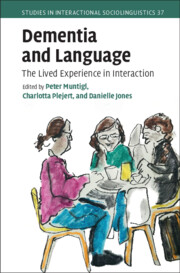Book contents
- Dementia and Language
- Studies in Interactional Sociolinguistics
- Dementia and Language
- Copyright page
- Contents
- Figures
- Tables
- Contributors
- Transcript notation key
- Part 1 Introduction
- Part 2 Dementia and Diagnostics
- Part 3 Dementia and Conversational Strategies
- 5 Using “Now What” to Discursively Compensate for Frontotemporal Dementia-related Challenges: A Longitudinal Case Study
- 6 Being Sociable
- 7 On the Use of Tag Questions by Co-participants of People with Dementia
- 8 Initiating and Pursuing a Topical Agenda with Limited Communicative Resources
- Part 4 Dementia and Epistemics
- Part 5 Communicative Challenges in Everyday Social Life
- Index
- References
5 - Using “Now What” to Discursively Compensate for Frontotemporal Dementia-related Challenges: A Longitudinal Case Study
from Part 3 - Dementia and Conversational Strategies
Published online by Cambridge University Press: 21 November 2024
- Dementia and Language
- Studies in Interactional Sociolinguistics
- Dementia and Language
- Copyright page
- Contents
- Figures
- Tables
- Contributors
- Transcript notation key
- Part 1 Introduction
- Part 2 Dementia and Diagnostics
- Part 3 Dementia and Conversational Strategies
- 5 Using “Now What” to Discursively Compensate for Frontotemporal Dementia-related Challenges: A Longitudinal Case Study
- 6 Being Sociable
- 7 On the Use of Tag Questions by Co-participants of People with Dementia
- 8 Initiating and Pursuing a Topical Agenda with Limited Communicative Resources
- Part 4 Dementia and Epistemics
- Part 5 Communicative Challenges in Everyday Social Life
- Index
- References
Summary
This chapter analyzes the discursive functions of a single interactional practice – the use of the phrase “now what” – that is recurrently employed by an individual diagnosed with behavioral variant frontotemporal dementia (bvFTD; pseudonym Robert). Robert’s use of “now what” recruits assistance from interlocutors when a wider array of recruitment resources may not be readily available. I show how this practice calls on collaborators to articulate the next step of a task-based activity for which Robert requires guidance. I also examine how Robert employs “now what” over the course of a year. Over time, Robert begins to employ “now what” to navigate non-task-based activities, such as when being reprimanded, showing how he extends its use as he faces new interactional challenges. Some research examines "dementia interactions" through a lens of deficit; other research emphasizes skillfulness. I show how “now what” illuminates both the troubles Robert faces while simultaneously demonstrating his resourcefulness to navigate such troubles. I argue that such "compensatory" practices point to both deficit and skill, and suggest that a dichotomous framework – identifying a practice or behavior as either only a deficit or a skill – is unlikely to adequately capture the social engagement of those diagnosed with neurological disorders.
Keywords
- Type
- Chapter
- Information
- Dementia and LanguageThe Lived Experience in Interaction, pp. 103 - 127Publisher: Cambridge University PressPrint publication year: 2024

